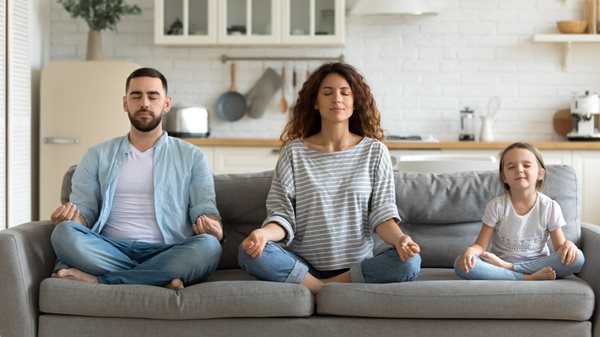
Are to-do lists keeping you up at night? Have internal debates about back to school, seeing family, and the uncertainty of future plans, started to overtake your day? Right now parents and children alike are dealing with big changes in routine thanks to the ongoing COVID-19 pandemic. The unpredictable environment can feel overwhelming for kids and adults and, sometimes, it can feel like we're getting swept up in things far beyond our control.
This is where mindfulness can come in. Simply put, mindfulness is a way of staying in the now by focusing on the present moment. If you've ever stopped to take a deep breath and clear your mind, you have already practiced mindfulness. Mindfulness is about paying attention to the present moment without judgment, and with kindness and acceptance. Mindfulness is a way of calming your brain and body by tuning in and paying close attention to what you're doing. Not surprisingly, children are often inherently mindful--think of the way the world melts away for a four-year-old playing house, or when a child sits with a favorite book.
Here are some quick tips and activities to help your family practice mindfulness together.
Notice Your Breathing
Paying attention to your breathing is a powerful way to connect with your body and calm down an overworked nervous system. Your child can place a small stuffed animal (a breathing buddy) on their belly and breathe it up and down. Alternately, children can breathe in like they’re smelling a flower and breathe out like they’re blowing out candles. For really young children, blowing bubbles can also be a way to accomplish this. Finally, have your children use the finger of one hand to trace up and down the fingers on their other hand. As they trace up, they inhale; as they trace down, they exhale.
Go Outside
It’s often easier to be mindful outside, away from screens and other indoor distractions. Most types of outdoor play are inherently mindful, but a focused walk can also be a lot of fun. Take your time with the walk. It’s not about getting anywhere; rather, it’s just being present for whatever comes up along the way. Some children may do better with more concrete suggestions; you can invite them to notice three things they can see, three things they smell, hear, touch, etc.
Create Together
Creative activities such as stringing beads, building with blocks, painting rocks, or singing silly songs help children to be present in the moment as they make choices, solve problems, and stick with activities even when they get bored or frustrated.
Check The Weather
Our moods and feelings come and go, just like the weather. Step outside and notice the weather – Is it warm? Cold? Is the sky clear or cloudy? After that, check in with your internal weather. Are you feeling hot and angry? Cool and calm? Notice those feelings, and then notice when they pass, as they always do, just like a storm always passes.
Say "Thank You"
The practice of gratitude, or hakarat hatov, calls on us to step outside of the chaos of our minds and lives, come into the present moment, and find something to be grateful for. This is a powerful practice for parents and children alike.
Practice Chesed, Kindness
Mindfulness is all about kindness and compassion, and the more we practice kindness, the better we’ll get at it. When you see or hear an ambulance race by, send happy and healthy wishes to everyone involved. Play cooperative games. "fill each other’s buckets,". or draw a card or write a picture to send to a family member, friend, or other loved one.
Read Together
Reading is also an inherently mindul practice—and looking at beautifully illustrated books can be a wonderful way to find focus and quiet. Here are three PJ Library titles with art and illustrations that work as mindfulness tools.
Related: How to Help Children Manage Big Emotions
As this lovely book reminds us, the world is filled with beautiful things -- big and small. The trick is to remember to take note of them.
The Night World features stunning illustrations, quiet drama, and a spot-on portrayal of the thoughts and perceptions of a young child. The book encourages readers to participate in the Jewish value of recognizing and acknowledging nissim she b’chol yom, the wonders of everyday life.
A great way to use this book as part of a mindfulness exercise is to study the pictures with your child. Take the book, and going slowly page by page, talk about what you each notice in the images.
More
Quiet Music from PJ Library's Spotify Playlist
Mindfulness For Children (New York Times Wellness Guide)
About the Author
Carla Naumburg, PhD, LICSW is a clinical social worker, writer, and speaker. She is the author of three parenting books: Ready, Set, Breathe: Practicing Mindfulness with Your Children for Fewer Meltdowns and a More Peaceful Family (New Harbinger, 2015) and Parenting in the Present Moment: How to Stay Focused on What Really Matters (Parallax, 2014), and the bestselling How to Stop Losing Your Sh*t With Your Kids (Workman, 2019). Her writing has appeared in The New York Times, The Washington Post, The Huffington Post, and Mindful Magazine, among other places. Carla lives outside of Boston with her husband, two young daughters, and two totally insane cats.
August 10, 2020